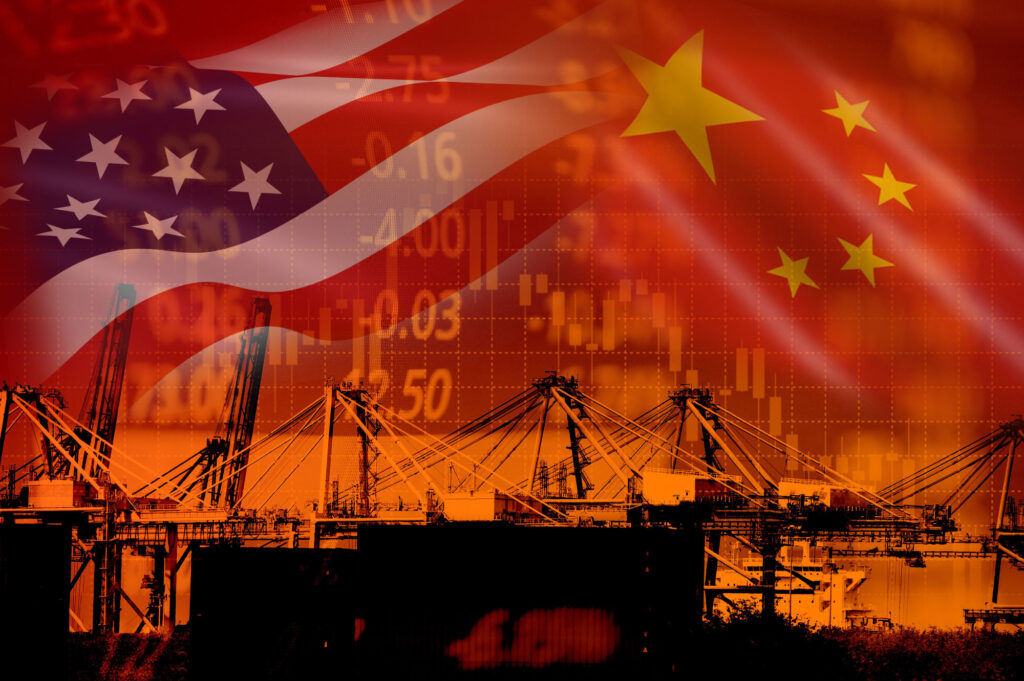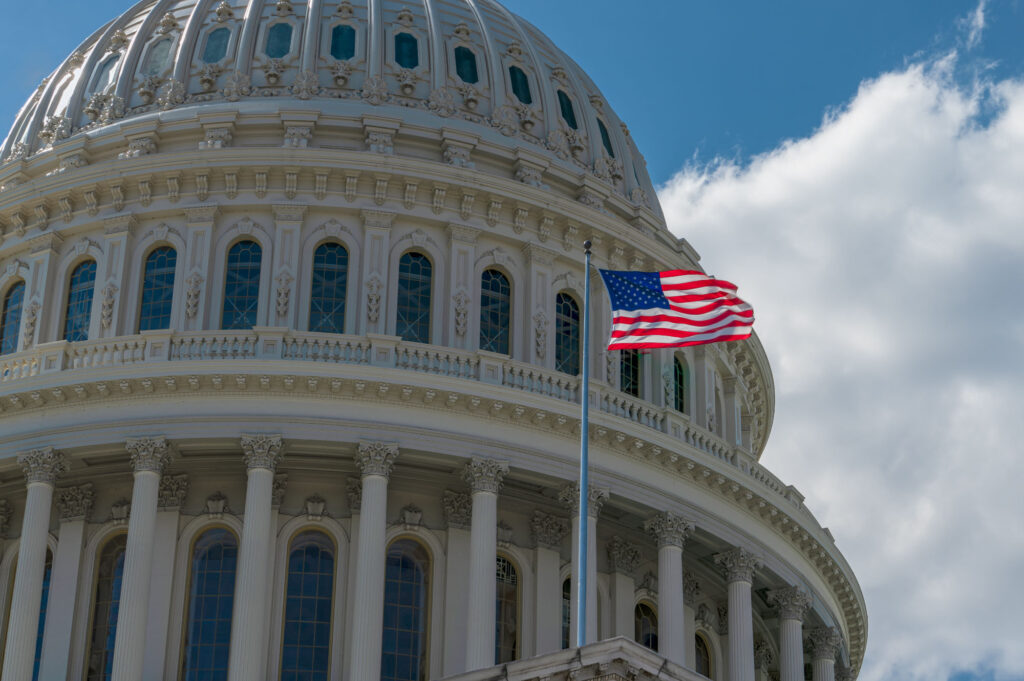WCIT Policy Agenda
WCIT Policy Agenda
On behalf of our members, WCIT takes an active role in advocating to our elected officials and working with various coalitions for trade and investment policies that increase the competitiveness of Washington state interests, particularly large and small business, farmers, ranchers, growers and workers. We highlight the following critical issues recognizing the global marketplace is fast-paced and dynamic, so our agenda is ever changing.
Promote Trade as Vital to Washington State’s Economy
The Issue
Trade is critical to sustained economic growth. Nearly 41.5 million jobs – one out of every five in the United States — depend on international trade. According to the economic consulting firm The Trade Partnership, international trade, including exports and imports, supported close to one million Washington state jobs. These trade related jobs — at large and small companies, on farms, in factories and at corporate headquarters — grew four times faster than total employment between 1992 and 2019. Washington state has been particularly impacted by a double-hit of supply chain challenges and harmful tariffs. With 96% of the world’s consumers living beyond the U.S. borders, for Washington state to truly thrive and leverage its powerful advantages, it must fully engage in the global economy.
41.5 million jobs – one out of every five in the United States — depend on international trade. According to the economic consulting firm The Trade Partnership, international trade, including exports and imports, supported close to one million Washington state jobs. These trade related jobs — at large and small companies, on farms, in factories and at corporate headquarters — grew four times faster than total employment between 1992 and 2019. Washington state has been particularly impacted by a double-hit of supply chain challenges and harmful tariffs. With 96% of the world’s consumers living beyond the U.S. borders, for Washington state to truly thrive and leverage its powerful advantages, it must fully engage in the global economy.
WCIT Advocates
Our state’s economy relies on smart trade policies, actions and approaches. This starts with renewing U.S. global leadership on trade by advancing an ambitious market-opening trade agenda, pursuing new agreements and enforcing existing treaties. It includes moving away from a tariff-first strategy and seeking other more effective measures that do not harm Washington state businesses and consumers. WCIT advocates for a comprehensive trade policy using all the tools at our disposal, the strategic use of diplomacy and a search for common interests and motivations. By affirming our commitment to international trade and diplomacy, we can create the conditions for increased trade that can not only support current jobs, but also create new employment opportunities. While there are many pressing issues facing the country, we simply cannot afford to hit the pause button on trade. The United States must engage with international institutions, work with our allies, and resume our leadership role in shaping global trade.
Learn More
Read WCIT Research Report: How Global Disputes are Disrupting Trade in Washington State
Watch for new WCIT study coming out in April/May on Washington state trade
Advance Washington State Trade Priorities with China
The Issue
China has traditionally been Washington state’s top trading partner, accounting for over 20% of the state’s exports in 2017. Washington State has been hard hit by trade retaliation first imposed by the last Administration, through the use of Section 301 and Section 232 tariffs which remain in place. The current environment and the ongoing trade barriers have caused Washington’s diverse exports – everything from dairy to aerospace, auto parts to seafood and high-tech to apples, cherries and wheat – to suffer from these retaliatory measures.
trading partner, accounting for over 20% of the state’s exports in 2017. Washington State has been hard hit by trade retaliation first imposed by the last Administration, through the use of Section 301 and Section 232 tariffs which remain in place. The current environment and the ongoing trade barriers have caused Washington’s diverse exports – everything from dairy to aerospace, auto parts to seafood and high-tech to apples, cherries and wheat – to suffer from these retaliatory measures.
WCIT Advocates
WCIT understands and appreciates that the U.S. trading relationship with China is complex and competitive. However, we must address the costly and burdensome tariffs and retaliatory measures that negatively impact Washington state businesses and consumers alike. In lieu of an outright repeal of the Section 301 tariffs imposed on China, a series of policy actions are still critical. These include seeking reforms, including market access and intellectual property protections; holding China accountable for Phase One purchase commitments; addressing challenges in key areas including state subsidies, procurement, cybersecurity, digital trade, services, competition policy, protection for new drugs and biological products, agriculture, and manufacturing. We appreciate the restart and expansion of the tariff exclusion process to mitigate damage to U.S. stakeholders. WCIT supports efforts to work with trading partners and other allies to curtail unfair and anticompetitive tactics non-market economies like China can have on global commerce. We are also closely monitoring legislation currently pending in Congress and support provisions that, if smartly and strategically applied, will help our businesses be more competitive.
Learn More
Read the WCIT research report The United States – Chine Trade Dispute: Implications for Washington state
Strengthen the Competitiveness and Resiliency of Washington’s Ports
The Issue
Washington state ports play a crucial role in the  state’s economic competitiveness. Our ports reach far beyond the Puget Sound region, with an extensive network of ports, railways, rivers and highways that has a positive impact on communities and jobs throughout the state. Beyond facilities in Seattle and Tacoma, the far-reaching state port system includes 75 distinct port districts across 33 of the state’s 39 counties. Activities at Washington’s public ports directly support more than 70,000 state jobs which, on average, pay 9% higher than wages across all industries. Statewide, through supply chain linkages and worker income expenditures, activities at Washington’s public ports support an additional 104,000 jobs. Our ports and railways/infrastructure, as well as our air cargo, are a vital links in our nation’s supply chain as nearly 60% of imported goods coming through the Northwest Seaport Alliance are bound for destinations outside the Pacific Northwest.
state’s economic competitiveness. Our ports reach far beyond the Puget Sound region, with an extensive network of ports, railways, rivers and highways that has a positive impact on communities and jobs throughout the state. Beyond facilities in Seattle and Tacoma, the far-reaching state port system includes 75 distinct port districts across 33 of the state’s 39 counties. Activities at Washington’s public ports directly support more than 70,000 state jobs which, on average, pay 9% higher than wages across all industries. Statewide, through supply chain linkages and worker income expenditures, activities at Washington’s public ports support an additional 104,000 jobs. Our ports and railways/infrastructure, as well as our air cargo, are a vital links in our nation’s supply chain as nearly 60% of imported goods coming through the Northwest Seaport Alliance are bound for destinations outside the Pacific Northwest.
WCIT Advocates
The recent supply chain crisis highlighted the critical role of our ports in facilitating trade and keeping our economy moving. To remain a global hub, our ports must function efficiently, reliably, and competitively. WCIT advocates for investments in port related infrastructure, support for air cargo, reform of the Harbor Maintenance Tax (HMT), and policies and measures to promote greater operational predictability. These investments and measures can help make our port network competitive with British Columbia and California ports positioning the Northwest as a global hub of the Pacific.
Learn More
Read the WCIT research report: The Washington Port System: Gateways to Growth at Home and Opportunities Abroad.
Learn more at Washington Ports.
Address Global Supply Chain Challenges
The Issue
The global pandemic created international trade challenges that brought into sharp focus the fragility of our global supply chain. Bottlenecks of cargo ships, with trucking and railway transport complications resulted in skyrocketing shipping costs and slower movement of finished products and essential parts. This hurt businesses with production and hit consumers with higher prices and less selection. Our state’s critical infrastructure is essential in making trade and the movement of goods more reliable and predictable.
challenges that brought into sharp focus the fragility of our global supply chain. Bottlenecks of cargo ships, with trucking and railway transport complications resulted in skyrocketing shipping costs and slower movement of finished products and essential parts. This hurt businesses with production and hit consumers with higher prices and less selection. Our state’s critical infrastructure is essential in making trade and the movement of goods more reliable and predictable.
WCIT Advocates
WCIT supports greater supply chain resiliency with policies that foster geographic diversity of supply while avoiding new trade barriers and strict Buy American requirements that risk retaliatory measures. Smart infrastructure investments, including expanding our ports and improving our roads, bridges and rail lines will not only help increase capacity to import foreign goods and export Washington state goods, but will also give us greater flexibility to adapt to unexpected fluctuations in shipping traffic and trade patterns. WCIT advocates for appropriate funding targeted for freight mobility investments that make local corridors efficient and reliable and supporting options like air cargo to move goods, particularly perishables like fruits and vegetables, quickly and more efficiently. Identifying antiquated and inefficient practices and deploying the latest technologies to facilitate greater communications with all links in the supply chain can help as well. Washington and Oregon should also work cooperatively on joint projects that will boost the import and export capacity of the region’s freight mobility infrastructure.
Learn More
Read the WCIT statement on the Infrastructure Investment and Jobs Act
Read the WCIT research report The Pacific Northwest Global Trade Hub: Trade Impacts in Washington and Oregon
Support Washington state agriculture enabling our farmers to remain globally competitive
The Issue
American Farmers have been hit with harmful retaliatory tariffs, non-tariff barriers, and supply chain issues, including the reduction of seasonal exports that our state is so famous for producing. Tariffs have impacted the price of U.S. agricultural products in key regions resulting in losing markets to trade competitors. The Washington state horticulture industry, in particular, has lost sales and market share due to retaliatory tariffs imposed by China and India. For example, Washington growers exported $120 million in apples to India before retaliatory tariffs in 2018 and less than $20 million afterwards. This year, Congressional committees will be working to put together a new farm bill for 2023 with elements that directly affect trade and Washington state agricultural global competitiveness.
retaliatory tariffs, non-tariff barriers, and supply chain issues, including the reduction of seasonal exports that our state is so famous for producing. Tariffs have impacted the price of U.S. agricultural products in key regions resulting in losing markets to trade competitors. The Washington state horticulture industry, in particular, has lost sales and market share due to retaliatory tariffs imposed by China and India. For example, Washington growers exported $120 million in apples to India before retaliatory tariffs in 2018 and less than $20 million afterwards. This year, Congressional committees will be working to put together a new farm bill for 2023 with elements that directly affect trade and Washington state agricultural global competitiveness.
WCIT Advocates
Asserting U.S. leadership, pursing market-opening trade policies and forging new trade agreements would benefit our agriculture sector and are urgently needed. Our farmers need relief from retaliatory tariffs and removal of country-specific non-tariff barriers. WCIT believes that the agriculture sector and the implications of tariffs on our farmers need be addressed and considered in ongoing trade policy strategy such as the development of the Indo-Pacific Economic Framework, as well as agreements now contemplated with Japan, and resumption of negotiations with China.
Learn More
Expand Digital Trade Opportunities
The Issue
Today’s digital economy has transformed business and society in ways not previously envisioned. The global pandemic underscored an increasing reliance on digital commerce and trade. However, government policy is struggling to keep pace with the digital age. Structural, legal or regulatory barriers, including restrictions on cross border data flows, server location requirements, uneven liability regimes, and forced technology transfer, inhibit or outright block digital products and services, creating additional barriers. Nearly two-thirds of the digital economy, which is expanding three times as rapidly as the overall economy, consists of digital services. Growth is being driven by international trade and these service exports supported more than 2 million U.S. jobs in 2020. Small business exporters have the most to gain from digital technologies in overcoming longstanding hurdles to trade. Washington state’s digital commerce exports totaled nearly $2.9 billion between 2014 and 2018 helping support the nearly 250,000 Information, Communications and Technology (ICT) sector jobs as well as other associated businesses and workers throughout the state.
and society in ways not previously envisioned. The global pandemic underscored an increasing reliance on digital commerce and trade. However, government policy is struggling to keep pace with the digital age. Structural, legal or regulatory barriers, including restrictions on cross border data flows, server location requirements, uneven liability regimes, and forced technology transfer, inhibit or outright block digital products and services, creating additional barriers. Nearly two-thirds of the digital economy, which is expanding three times as rapidly as the overall economy, consists of digital services. Growth is being driven by international trade and these service exports supported more than 2 million U.S. jobs in 2020. Small business exporters have the most to gain from digital technologies in overcoming longstanding hurdles to trade. Washington state’s digital commerce exports totaled nearly $2.9 billion between 2014 and 2018 helping support the nearly 250,000 Information, Communications and Technology (ICT) sector jobs as well as other associated businesses and workers throughout the state.
WCIT Advocates
To ensure that businesses of all sizes can benefit from the digital transformation of the global economy, our trade agreements must be modernized to harness the opportunities of the digital age. WCIT advocates for pragmatic approaches to data governance through the pursuit of multilateral trade agreements modeled on provisions in the US-Mexico-Canada Agreement (USMCA) and the Comprehensive and Progressive Trans-Pacific Partnership (CPTPP). Supporting multilateral negotiations and agreements like the e-commerce negotiations underway at the WTO and avoiding punitive blockers to digital commerce like the European Union’s Digital Markets Act and Digital Services Act can build on this progress and unlock digital trade’s full potential to drive growth across our region.
Learn More
Read the WCIT’s Research Report Washington State Digital Trade: Barriers and Opportunities.
Pursue new and existing trade opportunities
The Issue
As one of the most trade-reliant state in the country, Washington state’s future economic growth depends on both building trade relationships with existing markets and strategically pursuing new market opportunities. Barriers exist for Washington state businesses and current agreements need to be modernized and updated to address the needs of the digital age. Washington state’s top export markets include countries like the UK and Japan where new agreements can lay the groundwork for expanded trade. Other emerging markets such as Israel, India and Kenya, offer great promise to enhance high-tech synergies and create new customers for Washington state goods and services.
Washington state’s future economic growth depends on both building trade relationships with existing markets and strategically pursuing new market opportunities. Barriers exist for Washington state businesses and current agreements need to be modernized and updated to address the needs of the digital age. Washington state’s top export markets include countries like the UK and Japan where new agreements can lay the groundwork for expanded trade. Other emerging markets such as Israel, India and Kenya, offer great promise to enhance high-tech synergies and create new customers for Washington state goods and services.
WCIT Advocates
WCIT supports U.S. efforts to negotiate new market-opening trade agreements with mature economic partners like Japan, the United Kingdom and the European Union. Exploring high-tech partnerships through binational foundations and programs such as the U.S Israel Binational Science Foundation (BSF), and fostering cultural and economic ties with markets like India can help spur further synergies that can boost innovation in Washington state. Washington state would also benefit from a more assertive trade posture to include the advancement in negotiations on comprehensive, market-opening and enforceable trade agreements with existing partners and new markets alike.
Learn More
Read WCIT’s research reports:
Washington state and Israel Trade: Leveraging Opportunities for Innovation and Growth
US-UK Free Trade Agreement: Opportunities and Challenges for Washington State
Support trade through international organizations
The Issue
Growing distrust of global institutions and standards  United Nation building, Geneva, Switzerland[/caption] has undermined the support and effectiveness of international organizations. The World Trade Organization, created in 1995 and built on the foundation of the 1947 General Agreement on Tariffs and Trade (GATT) has helped to modernize trade as we entered a new century by defining and enforcing the rules of the road. However, issues related to enforcement, perceived unfairness and slow responsiveness to a rapidly changing digital economy has eroded support for this international institution.
United Nation building, Geneva, Switzerland[/caption] has undermined the support and effectiveness of international organizations. The World Trade Organization, created in 1995 and built on the foundation of the 1947 General Agreement on Tariffs and Trade (GATT) has helped to modernize trade as we entered a new century by defining and enforcing the rules of the road. However, issues related to enforcement, perceived unfairness and slow responsiveness to a rapidly changing digital economy has eroded support for this international institution.
WCIT Advocates
WCIT continues to support the rules-based trading system embodied by the World Trade Organization (WTO), and its dispute settlement system. While constructive efforts to modernize and reform aspects of all global institutions are welcome and should be smartly pursued, the need for this global organization remains vitally important. WCIT believes modernizing the rules of the road and forging multilateral agreements on trade and enforcement is best achieved by pressing for improvements within the current system such as reforms to its Appellate Body. WCIT further believes it is advisable to use new agreements, whether it be the USMCA or updates to other trade pacts, as a foundation for broader application on a global level through WTO processes.
Learn More
Read Revitalizing the World Trade Council and Council on Foreign Relations piece How are trade disputes resolved
Empower Small Businesses through Access to Capital
The Issue
Trade and market exploration should be available to all commercial entities, particularly small businesses and farmers. As the United States’ official export credit agency, the EXIM bank offers export financing that enables Washington state’s small businesses and agriculture producers to make global sales and be competitive in foreign markets with less risk. The US Department of Agriculture has export financing programs available to farmers as well.
all commercial entities, particularly small businesses and farmers. As the United States’ official export credit agency, the EXIM bank offers export financing that enables Washington state’s small businesses and agriculture producers to make global sales and be competitive in foreign markets with less risk. The US Department of Agriculture has export financing programs available to farmers as well.
WCIT Advocates
WCIT applauds the Washington state congressional delegation for its ongoing support of the EXIM Bank and last year’s seven-year reauthorization to ensure the Bank is back to operating at full capacity. Many of our foreign competitors, such as China, Japan and Germany, have robust government-sponsored export financing programs that would have put U.S. exporters, particularly small and mid-sized businesses, at a disadvantage if the Bank was not operational. Moreover, the EXIM Bank is a self-sustaining agency that operates at no net cost to the U.S. taxpayer and also helps to support tens of thousands of Washington jobs and hundreds of local small businesses. Support for agriculture export programs, whether through EXIM Bank or existing U.S. Department of Agriculture programs, will also help more Washington state farmers reap the benefits of global trade.
Learn More
Read the WCIT research report The Export-Import Bank: Impact on Washington State Trade.
Pursue stronger economic ties with Asia Pacific markets
The Issue
Five years ago, the United States withdrew from the Trans-Pacific Partnership (TPP), a multilateral trade agreement designed to lower trade barriers and increase economic cooperation. In 2018, the remaining 11 members created the Comprehensive and Progressive Agreement for Transpacific Partnership (CPTPP). More than a billion people within the Asia Pacific region are projected to join the middle class this decade. The region already accounts for $1.75 trillion in trade with the United States and for 30 percent of U.S. goods and services exports, supporting millions of American jobs. The current administration has shared the broad outlines of an Indo-Pacific Economic Framework, including hosting in 2023 the APEC and Leaders meetings in the United States.
Trans-Pacific Partnership (TPP), a multilateral trade agreement designed to lower trade barriers and increase economic cooperation. In 2018, the remaining 11 members created the Comprehensive and Progressive Agreement for Transpacific Partnership (CPTPP). More than a billion people within the Asia Pacific region are projected to join the middle class this decade. The region already accounts for $1.75 trillion in trade with the United States and for 30 percent of U.S. goods and services exports, supporting millions of American jobs. The current administration has shared the broad outlines of an Indo-Pacific Economic Framework, including hosting in 2023 the APEC and Leaders meetings in the United States.
WCIT Advocates
At the time, WCIT supported passage of the TPP because the pact provided greater access to a number of important emerging markets, and closer economic engagement in a region where China’s influence is growing. Greater U.S. engagement in this region will help Washington state businesses and workers and WCIT therefore believes the U.S. should be open to pursuing a comprehensive, market-opening trade agreement with the region or be open to a potential entry into the CPTPP. The increased economic engagement suggested in the Indo-Pacific Economic Framework may be a good start, and WCIT looks forward to working with the Administration on this measure. However, any broad-based agreement needs to include elements that are enforceable and will provide greater market access for Washington state farmers and businesses. Provisions should also promote inclusive trade and economic growth, enable rules-based commerce, increase sustainability and promote shared values and interests as well as integrate small and medium sized businesses into the digital economy .
Learn More
Read the Letter from business organizations to the White House on Indo-Pacific Economic Framework
Read the Politico piece: Biden Promised to Confront China. First He Has to Confront America’s Bizarre Trade Politics. – POLITICO
Support Congressional Measures to Bolster American Trade Leadership
The Issue
The Biden Administration and Congress have an opportunity to work together to build smart trade policies. Trade programs and authorities that are designed to help forge bilateral and multilateral trade pacts have lapsed and need Congressional support and action. Trade is a key creator of employment and economic activity. Through engagement and pursuit of new agreements, the U.S. can continue to harness new opportunities.
opportunity to work together to build smart trade policies. Trade programs and authorities that are designed to help forge bilateral and multilateral trade pacts have lapsed and need Congressional support and action. Trade is a key creator of employment and economic activity. Through engagement and pursuit of new agreements, the U.S. can continue to harness new opportunities.
WCIT Advocates
To help American business and workers, Congress and the Administration need to pursue a robust, market opening trade agenda with appropriate legislation. This includes support for renewing Trade Promotion Authority (TPA) or Fast Track Authority, Generalized System of Preferences (GSP), and the Miscellaneous Trade Bill (MSB). Additional measures and reforms need to be considered as we work to modernizing processes and practices to meet the global demands of the digital age.
Learn More
Read the WCIT statement: Asserting American Trade Leadership
Explore Ways to Make Trade More Climate-Friendly
The Biden Administration has prioritized the pursuit of ‘worker-centric and climate-friendly’ policies, influencing how trade will be conducted. Efforts to reduce the carbon footprint, build sustainable fisheries and create more energy efficient and eco-friendly transport of imports and exports are at the forefront of this movement. Multi-nation discussion on the consequences of issues such as cross-border carbon taxes underscore some of the challenges and complexities inherent in meeting these broader climate objectives.
of ‘worker-centric and climate-friendly’ policies, influencing how trade will be conducted. Efforts to reduce the carbon footprint, build sustainable fisheries and create more energy efficient and eco-friendly transport of imports and exports are at the forefront of this movement. Multi-nation discussion on the consequences of issues such as cross-border carbon taxes underscore some of the challenges and complexities inherent in meeting these broader climate objectives.
WCIT Advocates
WCIT advocates measures that help modernize trade flows and processes in a way that will help support a more sustainable environment. This includes exploring increased production and adoption of sustainable aviation fuel to decrease the carbon footprint of air trade and cargo. Smart infrastructure investments and projects should focus on easing environmentally damaging traffic logjams and increasing the more efficient flow of goods. WCIT supports efforts to pursue opportunities through regional engagements to maintain and improve environmental protections, and facilitate trade in climate-friendly goods, services and technologies. Trade policy should incentivize innovations and encourage measures that support decarbonization, environmental conservation and clean energy. This includes good natural resource management and the role that sustainability plays as we compete globally.
Learn More
Read the WCIT Seattle Times Editorial: Sustainable aviation fuel: An important step in international trade
